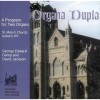传记
Jean-Joseph Mouret (April 11, 1682, Avignon - December 22, 1738, Charenton-le-Pont) was a French composer whose dramatic works made him one of the leading exponents of Baroque music in his country. Even though most of his works are no longer performed, Mouret's name survives today thanks to the popularity of the Fanfare-Rondeau from his first Suite de symphonies, which has been adopted as the signature tune of the PBS program Masterpiece and is a popular musical choice in many modern weddings.
Mouret's father was a prosperous silk merchant of Avignon, an amateur violinist who recognized his son's precocious musical abilities and provided him with a fine education. The elder Mouret generously supported his son's decision to pursue a musical career. As a youth, Mouret proved himself a talented singer while also earning success for his compositions.
Around the age of twenty-five, Mouret settled in Paris. News of his arrival did not take long to spread and he was introduced to Anne, Duchess of Maine, whose salon at Sceaux was a center of courtly society in the declining years of Louis XIV. His genial character strongly assisted him in securing the patronage of the Duchess, who made him her Surintendant de la musique at Sceaux about 1708. At Sceaux he produced operas and was in charge of the sixteen bi-weekly Grandes nuits in the season of 1714–1715, for which he produced interimèdes and allegorical cantatas in the court masque tradition, and other music, in the company of the most favoured musicians, for the most select audience in France. Mouret thus launched his adult career under highly favorable auspices.
His opéra-ballet Les fêtes, ou Le triomphe de Thalie ["Festivities, or The Triumph of Thalia"] with a libretto by Joseph de La Font was presented at the Opéra on August 19, 1714. In the prologue, in a scenic design which represented the stage of the Opéra, Thalia, the muse of Comedy, triumphs over Melpomene, the muse of Tragedy. This dramatic conceit resulted in a succès de scandale, obliging La Font to immediately prepare a revised opening entitled "La critique des fêtes de Thalie" (presented on October 9). In the 1720 edition the title was changed to Les fêtes de Thalie, and in 1722 a new opening was added, "La provençale", which featured regional costumes, instruments, and well-known melodies sung in the Provençal dialect. The 1722 version proved to be more acceptable and very popular, and continued to be performed up until 1778.[1][2]
Also in 1714 Mouret received an appointment as the director of the orchestra of the Opéra, a post which he held until 1718. From 1717 to 1737 he directed the Nouveau Théâtre Italien du Palais-Royal for which he composed divertissements that accompanied, for example, the tender comedies of Marivaux, and which, printed, fill six volumes. At court Mouret maintained a post as singer, and directed the grand divertissements offered by the Regent, the duc d'Orléans at his château of Villers-Cotterêts on the occasion of Louis XV's coming-of-age, 1722. Concurrently, he was director of the concert series established by the orchestra of the Opéra, the Concerts Spirituel (1728–34), positions which provided a public outlet for his own music and which permitted him to live in affluence.
Mouret married and had one daughter. However, his later years were overshadowed by financial and social disappointments. Sinking into poverty, Mouret died in a charitable asylum run by the Roman Catholic Church in Charenton-le-Pont.









